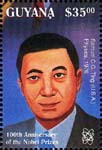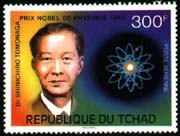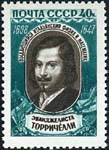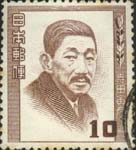
Croatian-American physicist, inventor. Born July 10, 1856 in Smiljan, Austria-Hungary. He was a pioneer in electric power, marketing the first electric appliance, a three blade fan, 1889. He died January 7, 1943 in New York, New York.


- Thomson Joseph John (1856-1940) United Kingdom

1906 Nobel Physics prize in recognition of the great merits of his theoretical and experimental investigations on the conduction of electricity by gases. Sir Joseph John Thomson, b. Dec. 18, 1856, d. Aug. 30, 1940, British scientist, discovered and identified the electron. At the age of 27 he succeeded (1884) Lord Rayleigh as professor of physics at Trinity College, Cambridge, and was named director of its Cavendish Laboratory in the same year, continuing in that position until 1919. Thomson demonstrated (1897) that cathode rays were actually units of electrical current made up of negatively charged particles of subatomic size. He believed them to be an integral part of all matter and theorized a model of atomic structure in which a quantity of negatively charged electrons was embedded in a sphere of positive electricity, the two charges neutralizing each other. In 1908 he was knighted. Thomson turned his attention to positively charged ions. His research showed that neon gas was made up of a combination of two different types of ions, each with a different charge, or mass, or both. He did this by using magnetic and electric fields to deflect the stream of positive ions of neon gas onto two different parts of a photographic plate. This demonstration clearly pointed to the possibility that ordinary elements might exist as isotopes (varieties of atoms of the same element, which have the same atomic number but differ in mass). Seven of his research assistants as well as his son, George, won Nobel Prizes for physics. He was accorded the honor of burial in Westminster Abbey.
-
Stepan Prokofievich Timoshenko, Ukraine

Stefan Timoschenko or Stepan Prokofyevich Timoshenko (23.12.1873-29.5.1972 Wuppertal/Germany).
Engineer, Scientist. 1927-1936 Michigan University, 1936-1960 Stanford

1976 Nobel Physics prize for pioneering work in the discovery of a heavy elementary particle of a new kind
- Tombaugh Clyde William

February 1906- Astronomer Clyde W. Tombaugh, the man who discovered Pluto, is born in Streator, Illinois. His first telescope was built of junked agriculture equipment. When the orbit of Neptune was equally found to contain some unexplained irregularities, it was suspected that another planet must exist, however, unlike in the case of Neptune, there was no prediction of where to find the source of the perturbations. Tombaugh found Pluto in 1930 from the Lowell observatory in Flagstaff Arizona the last planet of the solar system.

1965 Nobel Physics prize for fundamental work in quantum electrodynamics, with deep-ploughing consequences for the physics of elementary particles
- Torricelli Evangelista (1608-1647)


1964 Nobel Physics prize for fundamental work in the field of quantum electronics, which has led to the construction of oscillators and amplifiers based on the maser-laser principle
1998 Nobel Physics prize for their discovery of a new form of quantum fluid with fractionally charged excitations











